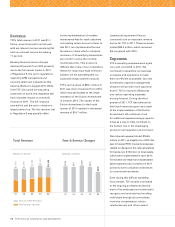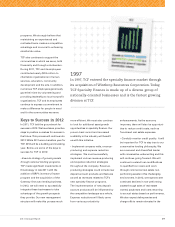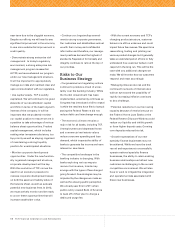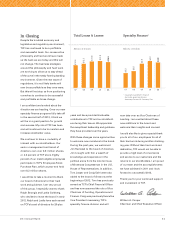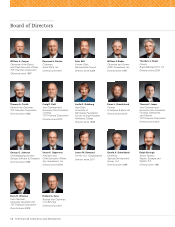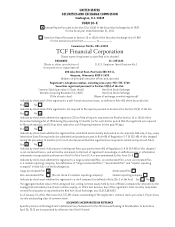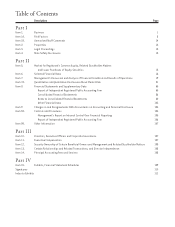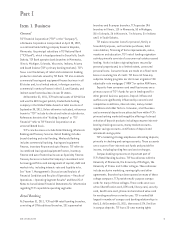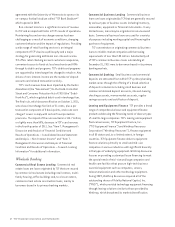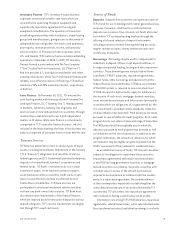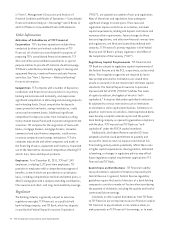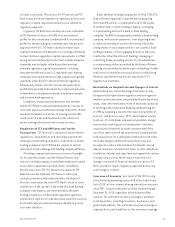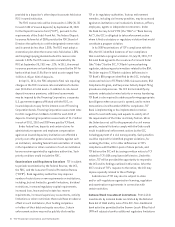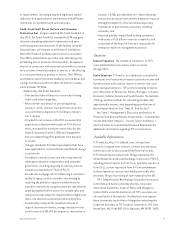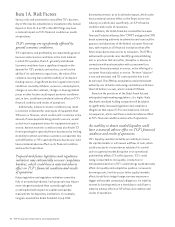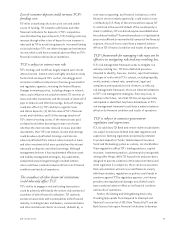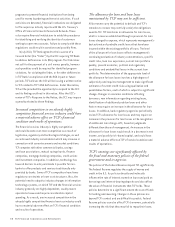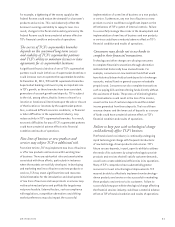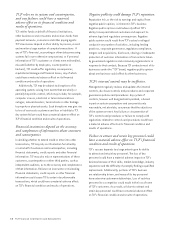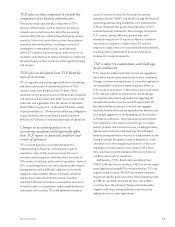TCF Bank 2011 Annual Report Download - page 21
Download and view the complete annual report
Please find page 21 of the 2011 TCF Bank annual report below. You can navigate through the pages in the report by either clicking on the pages listed below, or by using the keyword search tool below to find specific information within the annual report.Inventory Finance TCF’s Inventory Finance business
originates commercial variable-rate loans which are
secured by the underlying floorplan equipment and
supported by repurchase agreements from original
equipment manufacturers. The operation is focused on
establishing relationships with distributors, dealer buying
groups and manufacturers, giving access to thousands of
independent lawn and garden, electronics and appliance,
powersports, recreation vehicle, marine, and specialty
vehicle retailers. TCF Inventory Finance operates in the
U.S. and Canada. TCF Inventory Finance commenced lending
operations in December of 2008. In 2009, TCF Inventory
Finance formed a joint venture with The Toro Company
(“Toro”) called Red Iron Acceptance, LLC (“Red Iron”).
Red Iron provides U.S. distributors and dealers and select
Canadian distributors of the Toro® and Exmark® brands with
reliable, cost-effective sources of financing. TCF and Toro
maintain a 55% and 45% ownership interest, respectively,
in Red Iron.
Auto Finance On November 30, 2011, TCF entered the
auto lending market with the acquisition of Gateway One
Lending & Finance, LLC (“Gateway One”). Headquartered
in Anaheim, California, Gateway One originates and
services loans on new and used autos to customers through
relationships established with over 3,400 independent
dealers in 30 states. While auto finance is considered a
component of TCF’s specialty finance business, which is
included in wholesale banking, the loans in this business are
either a component of consumer loans or loans held for sale.
Treasury Services
TCF Bank has authority to invest in various types of liquid
assets, including United States Department of the Treasury
(“U.S. Treasury”) obligations and securities of various
federal agencies and U.S. Government sponsored enterprises,
deposits of insured banks, bankers’ acceptances and
federal funds. TCF Bank’s investments do not include
commercial paper, asset-backed commercial paper,
asset-backed securities secured by credit cards or auto
loans, trust preferred securities or preferred stock of
Fannie Mae or Freddie Mac. TCF Bank also has not
participated in structured investment vehicles and does
not have any bank-owned life insurance. TCF Bank must
also meet reserve requirements of the Federal Reserve,
which are imposed based on amounts on deposit in various
deposit categories. TCF’s reserve requirements are largely
met through TCF’s vault cash levels.
Sources of Funds
Deposits Deposits from customers are a primary source of
TCF’s funds for use in lending and for other general business
purposes. Consumer, small business and commercial
deposits are a source of low-interest cost funds attracted
from within TCF’s primary banking markets through the
offering of a broad selection of deposit instruments
including consumer interest-bearing checking accounts,
regular savings accounts, money market accounts and
certificates of deposits.
Borrowings Borrowings may be used to compensate for
reductions in deposit inflows or net deposit outflows, or
to support expanded lending, leasing and other expansion
activities. These borrowings may include Federal Home
Loan Bank (“FHLB”) advances, repurchase agreements,
federal funds, other borrowings and advances from the
Federal Reserve Discount Window. TCF Bank, as a member
of the FHLB system, is required to own a minimum level
of FHLB stock and is authorized to apply for advances on
the security of such stock, mortgage-backed securities,
loans secured by real estate and other assets (principally
securities which are obligations of, or guaranteed by, the
U.S. Government), provided certain standards related to
creditworthiness have been met. FHLB advances are made
pursuant to several different credit programs. Each credit
program has its own interest rates and range of maturities.
The FHLB prescribes the acceptable uses to which the
advances pursuant to each program may be made as well
as limitations on the size of advances. In addition to the
program limitations, the amounts of advances for which
an institution may be eligible are generally based on the
FHLB’s assessment of the institution’s creditworthiness.
As an additional source of funds, TCF may sell securities
subject to its obligation to repurchase these securities
(repurchase agreements) with major investment banks
or the FHLB utilizing government securities or mortgage-
backed securities as collateral. Generally, securities with
a market value in excess of the amount borrowed are
required to be maintained as collateral with the counter-
party to a repurchase agreement. The creditworthiness
of the counterparty is important in establishing that the
overcollateralized amount of securities delivered by TCF
is protected. TCF only enters into repurchase agreements
with institutions having a satisfactory credit profile.
Information concerning TCF’s FHLB advances, repurchase
agreements, subordinated notes, junior subordinated notes
(trust preferred securities) and other borrowings is set forth
32011 Form 10-K



